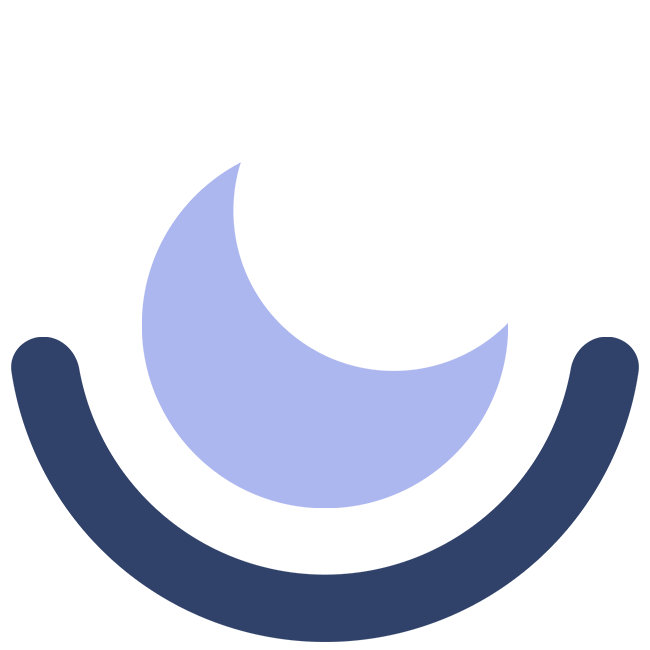Medical Disclaimer: The following content should not be used as medical advice or as a recommendation for any specific supplement or medication. It is important to consult your health care provider prior to starting a new medication or altering your current treatment.
Circadian rhythm sleep disorders are conditions that can arise when a person’s sleep-wake cycle is not aligned with the natural day and night cycle. These sleep disorders may be caused by problems with a person’s internal time-keeping processes or a misalignment between their biological clock and their environment.
How Circadian Rhythms Affect Sleep
Your pattern of going to sleep and waking up, also called your sleep-wake cycle, is affected by several circadian rhythms in your body. Circadian rhythms are internal patterns that influence daily cycles throughout the body. These patterns are regulated by the body’s biological or master clock.
The biological clock is influenced by both internal and external signals that help keep circadian rhythms synced with your surroundings. This clock is a cluster of nerve cells within the brain called the suprachiasmatic nucleus (SCN). It is located just above the nerves that receive information from the eyes, where it is well positioned to get cues from the environment.
When it starts perceiving less light, the SCN directs your brain to produce melatonin, a hormone that induces sleepiness. While light is the most important cue to keep your sleep-wake cycle in alignment with your environment, other time cues also keep it on track, including mealtimes, exercise, and being around other people.
Ideally, the times you go to sleep and wake up should line up with your circadian rhythms. A circadian rhythm sleep disorder can develop when your body’s ability to keep time is disrupted, or when your biological clock is out of alignment with the cycle of night and day.
Symptoms of Circadian Rhythm Sleep Disorders
The symptoms of circadian rhythm sleep disorders vary based on the type of disorder, though some symptoms are common to all types.
- Insomnia: People with circadian rhythm sleep disorders usually have significant difficulty getting to sleep. Insomnia may occur consistently, or it may come and go.
- Daytime sleepiness: Circadian rhythm sleep disorders commonly cause excessive daytime sleepiness during times when people are expected to be alert.
- Impaired thinking: The sleep disruption associated with circadian rhythm sleep disorders can affect a person’s thinking, attention, memory, and decision making.
- Sleep debt: Some people with circadian rhythm disorders do not get enough sleep, resulting in sleep debt. Chronic sleep debt, in turn, can contribute to other issues like depression, high blood pressure, and heart problems.
Types of Circadian Rhythm Sleep Disorders
There are several types of circadian rhythm sleep disorders. Some are caused by internal issues that cause the body to be out of sync with the environment. Others are due to external issues, like traveling to another time zone or having to be alert at night.
Delayed and Advanced Sleep-Wake Phase Disorders
Delayed sleep-wake phase disorder is one of the most common types. People with this disorder have a pronounced “night owl” tendency, finding it difficult to fall asleep at a reasonable time and struggling to awaken in time to get to school or work.
Delayed sleep-wake phase disorder occurs most often in teens and young adults. Developmental changes during puberty can affect sleep-wake timing and contribute to the disorder. This disorder also tends to run in families and may have a genetic component.

With advanced sleep-wake phase disorder, people fall asleep and awaken unusually early. This can make it difficult to participate in evening activities, since staying up late will lead to sleep deprivation. This disorder appears to be more common among men and older adults.
Advanced sleep-wake phase disorder is believed to have a genetic basis since it runs in families. Experts also think that people may develop this disorder when they are not exposed to enough time-keeping cues like daylight, or when they can’t adequately perceive light.
Non-24-Hour Sleep-Wake Rhythm Disorder
Non-24-hour sleep-wake rhythm disorder (N24SWD) affects about a third of people with total blindness. Because they cannot perceive light, their circadian rhythms can’t stay in sync with cycles of light and darkness in the environment. This disorder occurs more rarely in people who are not blind.
The sleep-wake cycle of people with N24SWD tends to drift slightly later every day, usually by one or two hours. This shifting means that people with N24SWD are sometimes out of sync with the time of day. At other times, their schedules sync up with night and day, and the disorder becomes less apparent.
Irregular Sleep-Wake Rhythm Disorder
Irregular sleep-wake rhythm disorder occurs when a person doesn’t have a distinct circadian rhythm in their sleep-wake cycle. People with this disorder sleep in several short fragments rather than one long stretch. They often nap multiple times a day and wake up frequently at night.
Irregular sleep-wake rhythm disorder often occurs in children with developmental disorders and in people with dementia. People who live in nursing homes or other care facilities often have less exposure to important environmental cues like light and social interaction. This can leave them more susceptible to the disorder or make the disorder worse.
Shift Work Disorder
Shift work disorder can arise in people who work shifts that don’t align with the external cycle of day and night, requiring them to be alert when it’s dark outside and to sleep during daylight hours. This mismatch interferes with their sleep-wake cycle, leading to insomnia and excessive sleepiness.
Night shifts, early morning shifts, and rotating shifts are most likely to cause sleep disturbances. People with shift work disorder usually don’t get enough sleep, and their accumulated sleep debt increases their chances of accidents and health problems. Their sleep quality may also be unsatisfactory.
Jet Lag
Jet lag occurs when a person travels across multiple time zones, causing a temporary mismatch between the timing of their biological clock and the conditions at their destination. This misalignment can disrupt circadian rhythms and make it hard to fall asleep and wake up at appropriate times. Jet lag can also cause daytime fatigue, headache, and difficulty thinking.
Jet lag becomes more severe as people cross additional time zones. Gradually, exposure to light and other environmental cues in the new location helps to align their circadian rhythm to their new surroundings.
Diagnosing Circadian Rhythm Sleep Disorders
If your doctor suspects that you have a circadian rhythm sleep disorder, they may collect your medical history, perform a physical examination, and ask you questions about your sleep and daytime habits. They may also ask you to keep a sleep log or sleep diary to track how much and how well you sleep.
Additionally, your doctor may recommend actigraphy, which measures sleep through a sensor worn on the wrist for up to 14 days. Less commonly, they may take blood or saliva samples to measure levels of the sleep hormone melatonin at different times of the day. This can give them more information about the way your circadian rhythm might be misaligned.
Treatments for Circadian Rhythm Sleep Disorders
Treatment for a circadian rhythm sleep disorder depends on the cause of the condition. Treatment strategies often aim to realign the sleep-wake cycle and address symptoms like daytime sleepiness and insomnia.
Behavior Change
A number of behavior changes may improve sleep hygiene and help match a person’s circadian rhythm to their desired sleep and wake times.
- Nap strategically: Most people with a circadian rhythm sleep disorder should avoid napping, especially in the afternoon. Shift workers are the exception, as they may benefit from naps just before their shifts or during a break.
- Keep to a regular schedule: Having fixed bedtimes and wake times seven days a week helps to stabilize circadian rhythms. It also helps to keep a regular schedule of mealtimes, socializing, and physical activity. For some conditions, sleep-wake times can be slowly adjusted to match a person’s needs.
- Take care with alcohol, caffeine, and nicotine: Alcohol and nicotine, especially close to bedtime, can lead to disrupted sleep. While caffeine may help with sleepiness at inappropriate times, it should be avoided in the hours prior to sleep.
- Relax before bedtime: Engaging in relaxing activities, as opposed to stimulating or stressful ones, helps the body wind down and prepare for sleep.
- Exercise: Daytime exercise can help keep circadian rhythms aligned. But avoid exercise within a few hours of bedtime.
Timed Melatonin
The use of melatonin supplements may help align a person’s circadian phase to their desired sleep and wake times. A doctor can discuss whether melatonin could be useful in a specific situation.
- Jet lag: Carefully timed melatonin use after or before travel may help minimize the effects of jet lag.
- Non-24-hour sleep-wake rhythm disorder: Timed melatonin use is the primary treatment for blind people who experience this disorder.
- Delayed and advanced sleep-wake phase disorders: Some evidence shows that timed melatonin may help realign circadian rhythms.
Light Therapy
Many people with circadian rhythm sleep disorders benefit from light therapy to realign their circadian rhythms with the environment. This can be as simple as spending time outdoors in the bright morning sunshine. In other situations, bright artificial light can help to normalize the sleep schedule.
Light therapy may also involve the use of a light box, light visors, or light glasses. Light therapy is often combined with the use of timed melatonin.
Medication
Doctors may medications to treat certain circadian rhythm sleep disorders, though in most conditions medications are of limited or no benefit. Medications that may be prescribed in some circumstances include:
- Drugs that promote wakefulness
- Drugs that help people get to sleep
- Drugs that work similarly to melatonin
References
Ask the Sleep Doctor
Have questions about sleep? Submit them here! We use your questions to help us decide topics for articles, videos, and newsletters. We try to answer as many questions as possible. You can also send us an email. Please note, we cannot provide specific medical advice, and always recommend you contact your doctor for any medical matters.


